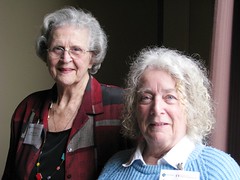A repost from The Alzheimer's Reading Room.
Keeping The Love Alive: The Power of "I Love You"
When I was growing up, my parents and I never said "I love you" to each other. Some families say things like "I love you" to each other. Some families don't...
Sheryl Lynn
Alzheimer's Reading Room
We didn't.
My mom and I were never close. That changed when I hit my mid-forties. I don't generally select the normal route through life, but my experiences caused me to go with the flow. I had my very own mid-life crisis. I decided to challenge my mom to fully step into the role of mom to help me through it. Her life experiences had deeply damaged her, and I'd been cautioned by her parents and her brothers to not put any pressure on her to do more than she did.
My mom and I were never close. That changed when I hit my mid-forties. I don't generally select the normal route through life, but my experiences caused me to go with the flow. I had my very own mid-life crisis. I decided to challenge my mom to fully step into the role of mom to help me through it. Her life experiences had deeply damaged her, and I'd been cautioned by her parents and her brothers to not put any pressure on her to do more than she did.
Well, her parents were now dead. So was her younger brother. Her older brother lived thousands of miles away. What did I have to lose"
I told her, "Mom, I'm going through a tough time and I need a mom. The family has always taught me not to put pressure on you. They told me you were a porcelain doll. They're dead now. You're still here. That tells me something important. I think you can handle it now. Will you be my mom and help me?"
Bless her, she stepped up to the challenge. We gradually formed a close bond with each other, made that much sweeter because it took over forty years to develop.
I decided, only forty-three years into our relationship, that it was time for us to say "I love you" to each other. The words awkwardly rolled off my tongue the first few times I said them to her. You'd think I was speaking a foreign language. I was. I didn't ask her to do it, but she eventually began to say the words back to me.
Wow, that felt weird. We'd never done that before. But the more we said it to each other, the better it felt to me. We got into the habit of ending each phone conversation by saying "I love you." It took her longer than it took me for it to feel good to her, but after enough time passed, I felt the happiness in her voice when she said it back to me. When we saw each other, we'd say it before we went to sleep. We got used to ending our days saying it to each other. It felt wonderful to finally have that kind of relationship with my mom, that we could say those powerful words to each other.
Then she fell.
My mom's head injury made her different.
She'd still say "I love you" to me, but the words now carried more fear than love. "I love you" now meant "Will you still be there for me, even though we both know I'm not what I used to be?"
No problem. True love never dies.
The head injury triggered the onset of dementia.
We'd still say the words to each other each day. We both needed to hear them, and we both needed to say them.
When I was no longer able to care for her, I said the words more often to her. Thank you, guilt.
I wanted her to know I still loved her even though I was unable to give her the care she now needed. It was so hard for me to hand her over to the care of strangers, even though I knew it was the right thing for both of us. The only words I now had to connect our hearts was "I love you." She always said it back to me. I knew she didn't judge me for what I was unable to do, even though I judged myself.
When she moved into the memory care unit at the assisted living facility, I made a point of saying the words at the end of each conversation. I'd have to say them louder now. There were constant distractions around her. It was hard for her to stay focused on what I was saying.
Her dementia and related conditions were slowly getting worse. Her deterioration never got in the way of our saying the words to each other. I'd walk into the living room at her facility to visit with her. Her eyes sparkled, and a big smile brightened her face when she saw me. She'd call out my name with the greatest joy. "SHERYL!!!!!"
Her love for me warmed all who saw us together. She'd become so loving when the clouds created by the illness parted to allow her true self to show through. After a lifetime of being afraid of being hurt by opening her heart to love, she radiated love.
On February 9 of this year, I got the phone call I knew would eventually come. The nurse at the facility told me my mom was dying and asked what decisions I wanted to make for end of life care. Her doctor, her nurse and I decided to keep her as comfortable as possible in her own bed. Hospice showed up within a few hours. They provided her with magnificent care. The staff loved my mom. They grieved her imminent death along with me and gave her beautiful support during her final days.
I drove way over the speed limit to get to her in time. I called her facility while I was driving to her. The nurse held her cell phone to my mom's ear so I could ask her to hold on if she possibly could, that I was on my way, that I loved her so much. The nurse said my mom smiled when she heard my voice, and her smile got bigger when I said "I love you." By the time I got to her, she was in a coma. I held her hand, saying everything I wanted to say to her during the next days. I'd wanted a two-way conversation. I'd wanted to hear her say "I love you" to me one more time. That didn't happen.
I knew she heard me, and I knew she knew I was there. She fluttered her eyelids when I spoke. One time, she sat upright in bed when I came to visit. I brought valentines each day and read them aloud to her. I knew this would be the last Valentine's Day we'd have together and wanted her to know how much I loved her.
I brought her colorful balloons that said "Happy Valentine's Day" and "I Love You" on them. My spiritual sister, who suddenly passed away five weeks after my mom, had suggested I get myself some balloons before my mom became ill. I brought those balloons with me. They floated to the ceiling, symbols of my love to stay with my mom when I was away from her bedside.
She passed away on February 13. The funeral and burial, in keeping with Jewish tradition, took place the next day. Valentine's Day.
I didn't get a chance to thank all her caregivers after she passed away. They treated her with the love and respect I'd wanted for her. One of her caregivers, a beautiful young woman named Penny, was on duty when I called about a month ago. Penny knew how difficult it was for me to be away from my mom for financial reasons. She'd left her family in Africa to move to America to make money to send home.
I thanked Penny for all she'd done to help my mom. I told her she was one of my mom's favorites and that I felt a special connection with her as well.
And Penny gave me a great and unexpected gift. She read my mind, and she read my heart.
She said, "Your mother knew how much you loved her. She always said to me, 'I know Sheryl loves me because she always says it to me when she gets off the phone."
My mom was unable to speak these words to me at the end of her life. Thank God that Penny could.
Never underestimate the power of saying "I love you" to your loved ones, with or without dementia.
Sheryl Lynn is the author of the upcoming book "The Light Is A Thank You," which chronicles the spiritual journey through dementia she has taken with her mother, Eleanor. She is the host of "Glow With The Flow Radio Show," currently on hiatus.
 Image by all that improbable blue via Flickr
Image by all that improbable blue via Flickr

